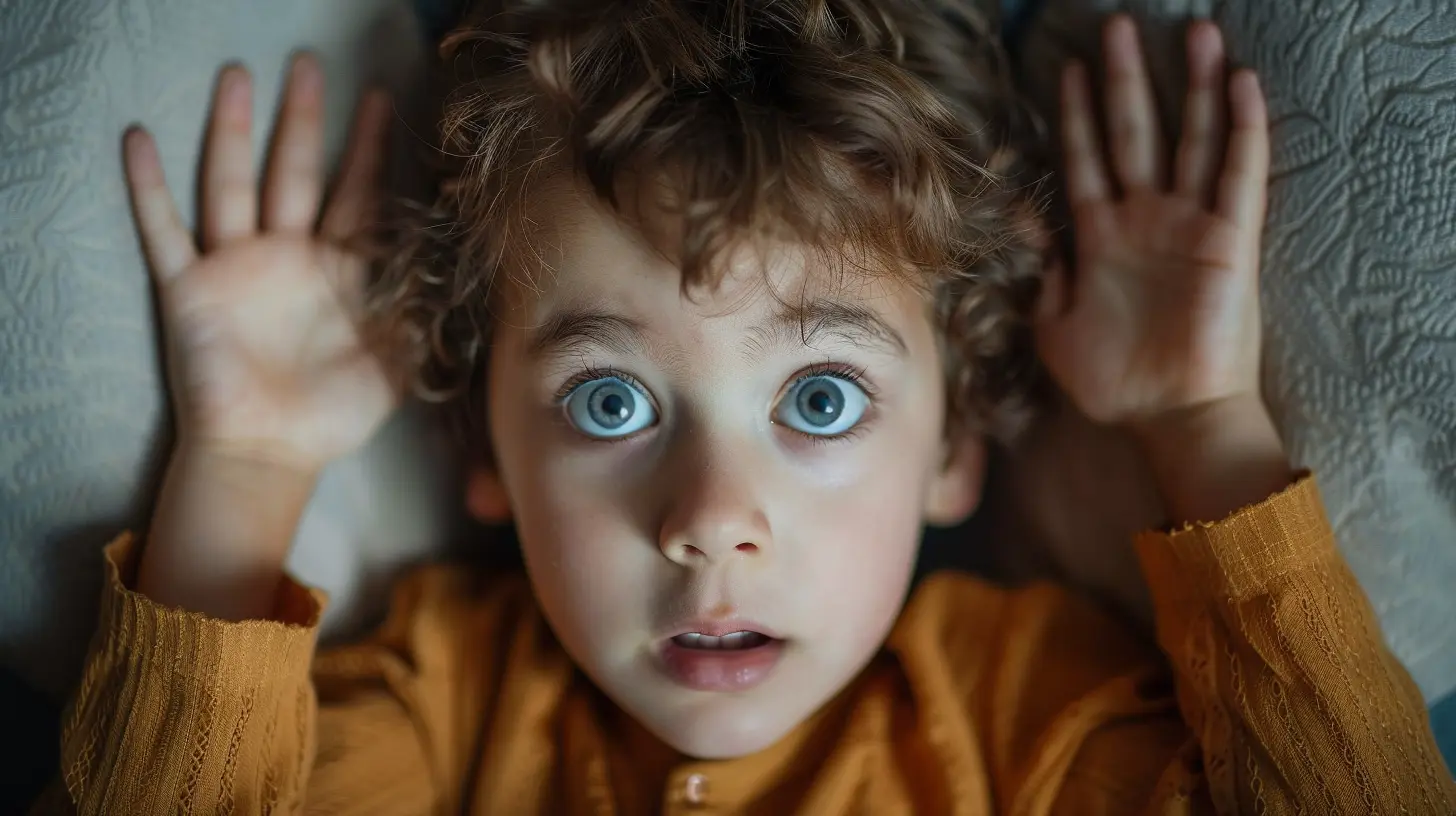When to Seek Professional Help for Your Child’s Fear
17 June 2025
Fear is a natural part of childhood. From imaginary monsters under the bed to the fear of the dark, kids often develop various anxieties as they grow. But when does normal fear turn into something more concerning? How do you know when your child needs more than just reassurance and comfort?
Let’s break it down and figure out when it’s time to seek professional help for your child's fear. 
Understanding Childhood Fears
Every child experiences fear at some point. It’s a normal part of their development as they learn about the world. Some fears are common in specific age groups:- Infants & Toddlers: Loud noises, strangers, separation from parents.
- Preschoolers: The dark, imaginary monsters, being alone.
- School-Age Children: Fear of real-world dangers like burglars, storms, or getting hurt.
- Teenagers: Social anxiety, school performance, fear of failure.
Most of the time, these fears fade as children grow and develop coping skills. However, persistent or extreme fears can interfere with daily life, causing distress for both the child and their family. 
When Is Fear a Problem?
So, when should you start worrying? Here are some red flags that indicate your child's fear might be beyond what’s considered normal:1. The Fear Persists for Months
If your child has been terrified of something for six months or longer with no signs of improvement, it might be more than just a phase.2. It Interferes with Daily Life
Is your child refusing to go to school, avoiding social situations, or unable to sleep alone because of their fear? If it affects their daily routine, school performance, or relationships, it’s a problem.3. Extreme Reactions
Does your child cry uncontrollably, freeze in fear, or have full-blown panic attacks? When fears trigger extreme emotional or physical reactions, professional intervention may be needed.4. Avoidance at All Costs
It’s one thing to feel scared, but if your child goes to extreme lengths to avoid situations that trigger their fear, it could lead to more significant anxiety disorders.5. Unrealistic or Irrational Fears
Some childhood fears are logical (like thunderstorms or getting lost). But when fears seem excessively irrational, such as believing a shadow means someone is watching them 24/7, it’s something to address.6. Changes in Behavior and Mood
If your usually happy child is now withdrawn, irritable, or constantly anxious, their fear might be taking a toll on their mental health.7. Physical Symptoms Show Up
Headaches, stomachaches, nausea, or even trembling—if your child frequently complains of feeling sick when faced with their fear, their body might be reacting to intense stress.
What Causes Intense Fears in Children?
There’s usually more going on beneath the surface. Some common causes of extreme fears include:- Genetics: Anxiety often runs in families.
- Trauma: A frightening experience (like a car accident or getting lost) can lead to long-term fear.
- Parenting Style: Overprotective parenting can unintentionally reinforce fear.
- Exposure to Media: Scary movies, news stories, or even overhearing adult conversations can trigger anxiety.
- Big Life Changes: Moving, divorce, bullying, or academic pressure can increase fear-based anxieties.
Understanding the cause can help determine how to approach the situation. 
When to Seek Professional Help
If you’re noticing the red flags and feeling unsure about how to help your child, considering professional support is a smart decision. You don’t have to wait for the fear to become debilitating. Here’s when to reach out:1. When Fear Becomes a Phobia
If your child’s fear is so intense that it manifests as a phobia—an overwhelming, irrational fear of something—they might need cognitive-behavioral therapy (CBT) or other professional interventions.2. If Your Child Feels Out of Control
Does your child express frustration over their fear, saying things like, “I don’t know why I feel this way”? If they struggle to manage their emotions, therapy can teach them coping strategies.3. When Anxiety Takes Over Their Life
If your child constantly feels on edge, worries excessively, or avoids everyday activities because of fear, addressing the issue sooner rather than later can prevent long-term anxiety disorders.4. If Their Physical Health is Affected
Frequent tummy aches, headaches, muscle tension, or panic attacks linked to fear shouldn’t be ignored. Anxiety can take a toll on their growing bodies.5. If You’re Feeling Overwhelmed as a Parent
Sometimes, you just don’t know what to do. And that’s okay! If you feel like you’ve tried everything—talking, reassuring, distracting—but nothing works, getting help from a child psychologist, counselor, or therapist can be a game-changer.What Kind of Help Is Available?
Seeking professional help doesn’t mean your child has a serious disorder. Therapists use various child-friendly techniques to help kids manage fear. These include:- Cognitive-Behavioral Therapy (CBT): Helps kids understand their fears and gradually face them in a safe way.
- Play Therapy: Ideal for younger children who express emotions through play.
- Exposure Therapy: A gradual process of desensitization to their fear in a controlled manner.
- Relaxation Techniques: Breathing exercises, mindfulness, and visualization help children stay calm.
- Parental Guidance Sessions: Equipping parents with tools to support their child at home.
Therapy isn’t about “fixing” your child—it’s about giving them the tools to overcome fear in a healthy, manageable way.
How to Support Your Child at Home
Professional help is valuable, but what can you do at home to help your child cope with fear?1. Validate Their Feelings
Instead of saying, “That’s silly, there’s nothing to be scared of,” try, “I understand this feels scary for you. I’m here to help.”2. Encourage Small Steps
If your child is afraid of the dark, don’t force them into total darkness. Start with a nightlight, then gradually dim it over time.3. Model Calm Behavior
Kids mirror their parents. If you react with panic or frustration, they’ll pick up on it. Stay calm, even if their fear seems excessive.4. Avoid Enabling the Fear
If your child fears dogs, avoiding them entirely reinforces the fear. Instead, gradually introduce them to friendly, calm dogs at a pace they can handle.5. Teach Relaxation Techniques
Guided breathing, counting exercises, or even squeezing a stress ball can help manage anxiety in the moment.6. Keep Communication Open
Let your child know they can talk to you about their fears without judgment. Open conversations reduce feelings of isolation.Final Thoughts
It’s completely normal for kids to have fears, but when those fears start controlling their lives, it’s time to take action. Recognizing when to seek professional help can make a world of difference in your child’s emotional well-being. As parents, we want to shield our kids from distress, but sometimes, the best thing we can do is equip them with the right tools to face their fears head-on.If you’re worried, trust your instincts. Seeking help isn’t a sign of failure—it’s a step toward giving your child the confidence they need to navigate their fears and thrive.
all images in this post were generated using AI tools
Category:
Dealing With FearsAuthor:

Steven McLain
Discussion
rate this article
3 comments
Shannon McKay
This article provides valuable insight into recognizing when a child's fears may require professional intervention. It’s essential for parents to trust their instincts and seek help if fears interfere with daily life or development. Early support can make a significant difference in a child's well-being.
June 22, 2025 at 3:52 AM

Steven McLain
Thank you for your thoughtful comment! I completely agree that trusting parental instincts and seeking early support is crucial for a child's well-being.
Finn Cox
Great article! It’s so important to recognize when our little ones need extra support. Trusting our instincts and seeking help can make a world of difference for them.
June 21, 2025 at 4:30 AM

Steven McLain
Thank you! I'm glad you found the article helpful. Trusting our instincts is key in supporting our children's needs.
Monique Ramos
Recognizing when a child's fear escalates beyond typical developmental stages is crucial. Signs such as persistent anxiety, avoidance behaviors, or impacts on daily functioning warrant professional guidance. Early intervention can foster coping strategies and emotional resilience, ensuring a healthier emotional landscape for the child.
June 17, 2025 at 4:47 AM

Steven McLain
Thank you for highlighting the importance of recognizing signs of escalating fears in children. Early intervention is key to fostering resilience and emotional health.



